Mélo Blu-ray Movie
HomeMélo Blu-ray Movie 
Arrow AcademyArrow | 1986 | 110 min | Not rated | Apr 09, 2019
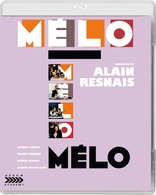
Movie rating
6.7 | / 10 |
Blu-ray rating
| Users | 0.0 | |
| Reviewer | 3.0 | |
| Overall | 3.0 |
Overview
Mélo (1986)
Pierre and Marcel are both celebrated concert violinists and lifelong friends, in spite of their differing temperaments. Pierre is modest, sensitive and content with his lot; Marcel is hungry, driven, and pursues a solo career that takes him to the four corners of the world. After years apart, the two friends reunite when Pierre invites Marcel to his home for dinner. It is then that Marcel first meets Pierre's wife Romaine, sparking a passionate affair that can only end in tragedy before the curtain falls.
Starring: Sabine Azéma, Fanny Ardant, Pierre Arditi, André Dussollier, Jacques DacqmineDirector: Alain Resnais
| Foreign | Uncertain |
| Drama | Uncertain |
| Romance | Uncertain |
| Period | Uncertain |
Specifications
Video
Video codec: MPEG-4 AVC
Video resolution: 1080p
Aspect ratio: 1.66:1
Original aspect ratio: 1.66:1
Audio
French: LPCM Mono
Subtitles
English
Discs
Blu-ray Disc
Single disc (1 BD)
Playback
Region A, B (locked)
Review
Rating summary
| Movie | 3.0 | |
| Video | 3.5 | |
| Audio | 4.0 | |
| Extras | 2.0 | |
| Overall | 3.0 |
Mélo Blu-ray Movie Review
Reviewed by Jeffrey Kauffman April 15, 2019Sometimes even inveterate “word hounds” like yours truly can stumble across new information, in the “maybe you can teach an old dog — and/or hound — new tricks” department. Such was the case when one of the supplements on this Blu-ray mentioned that the Greek root μέλος ( melos , for the uninitiated) is a cognate of both “melody” and “melodrama”. I'm guessing that may very well be obvious to a bunch of you, but it frankly escaped my recognition until it was pointed out by analyst Jonathan Romney in one of the extras adorning this release. That same root also (perhaps more obviously) provides the title for Mélo, a rather interesting film from the legendary Alain Resnais, though anyone expecting the same sort of philosophical ruminations and presentational ambiguities that informed either Hiroshima mon amour or Last Year at Marienbad may be surprised, and potentially disappointed, by the rather blatant theatricality, meaning “staginess”, of this film. In fact the whole dialectic of “stage vs. cinema” is at the heart of understanding Mélo, as Romney also gets into in his appealing piece.
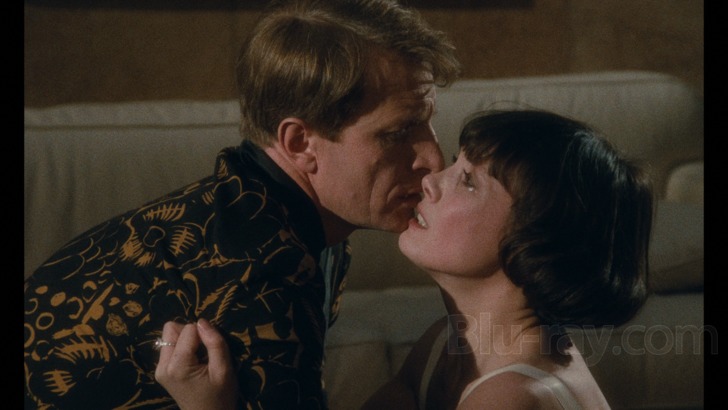
As much of a non sequitur as this may admittedly may be, a central plot conceit in Mélo kind of weirdly brought to mind a now pretty much forgotten sitcom, Bosom Buddies, not because there are any crossdressing shenanigans going on in the film, but due to the “meta” aspect of what happened to that series’ two stars. Some trivia fans may remember that the show co-starred Tom Hanks and Peter Scolari, then at the relatively early stages of their careers. The show didn’t last all that long, running a season and a half from 1980 to 1982, but within just a couple of years of its demise Hanks was already beginning his climb up the film superstar ladder with his big screen debut in Splash, and by 1988 had put the first notch in his Academy Award bedpost for his work in Big. Scolari, on the other hand, while having a career that many actors probably would have been happy to experience, found himself consigned to largely supporting roles in such television fare as his very appealing (and Emmy nominated) work in Newhart, along with a smattering of feature films. Now, there’s absolutely nothing for Scolari to be ashamed of, but let’s face it — when comparing the two erstwhile coworkers, Hanks pretty obviously came out better, at least in terms of the perceived metrics of what “Hollywood success” is “supposed” to look like.
Something rather similar is at play with regard to the two male characters in Mélo, a film which might be thought of pretty accurately as either a “three hander” or potentially (and at most) a “four hander”. The two men are Pierre Belcroix (Pierre Arditi) and Marcel Blanc (André Dussollier), both professional violinists, but with pretty radically different career paths, and as a result, levels of “success” (again, as perceived by others). Marcel tours the world with his music, while Pierre has “settled” for a more routine, small scale, life, which at least includes the blandishments of marriage to Romaine (Sabine Azéma). The “melodrama” implied by the film’s title arises when Romaine decides Marcel might be the better option for her going forward, with both an illicit affair and perhaps even hints of murder ensuing.
I actually mentioned Mélo in my recent The Magic Flute Blu-ray review, since that film also toes a thin line between “theater” and “film”. But the similarity probably ends there. As I mentioned in my take on the Bergman piece, the skill sets for theater and film directors don’t necessarily overlap, as odd as that may sound. But perhaps even more saliently when discussing any kind of film based on a pre-existing stage work, the source material holds the key in terms of what can even be built upon. When you’re dealing with Mozart, you really don’t have much to worry about. I’m not sure that Henri Bernstein’s play provides enough intrigue, at least in this version. Maybe Resnais should have taken that melo root literally and done a musical version, especially since music plays such an important part in the subtext.
I’m frankly not quite sure how I feel about Mélo. While Jonathan Romney makes a cogent case for approaching the film with a built in “meta” aspect due to its unabashed theatrical sensibility (down to interstitial red curtains appearing between “acts”), I felt myself distanced from the material in an almost dissociative kind of way. Another “meta”, namely a certain metaphysical grandeur, seemed to accompany many of Resnais’ best remembered earlier films, but what repeatedly struck me about Mélo is how literal it all is. From the proscenium arch to what might almost be called literal “set pieces” (meaning they’re obviously taking place on sets), Mélo seems to be “indicating” in both the normal and pejorative uses of the term. This is also a relentlessly talky film, something that may tend to undercut the supposed out of control passions being experienced.
Mélo Blu-ray Movie, Video Quality 
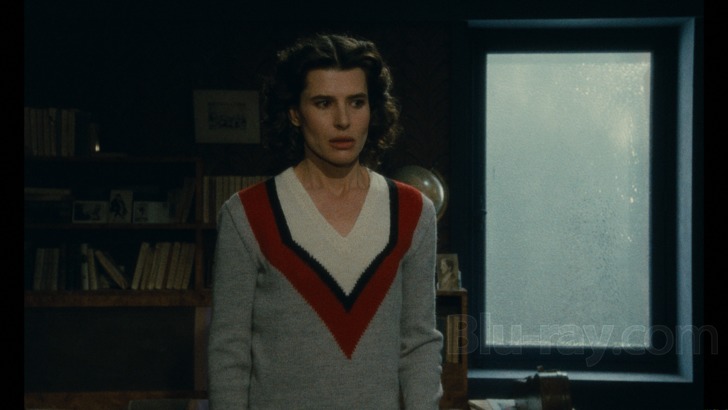
Mélo is presented on Blu-ray courtesy of Arrow Academy with an AVC encoded 1080p transfer in 1.66:1. Arrow's insert booklet contains the following information about the transfer*:
Mélo is presented in its original aspect ratio of 1.66:1 with 1.0 mono audio. The master was restored in 2K by MK2 and delivered to Arrow Films.That kind of generic statement may indicate that, while perfectly watchable (and perhaps better looking in motion than some of these screenshots may indicate), this is a title that might benefit from a freshening up (though some online sources denote this as a "new 2K restoration"). As can probably be made out fairly easily in many of the screenshots accompanying this review, this is a fairly coarse looking presentation, with a noticeably textured looking grain field. The palette has some fairly wide variances, and a few selected shots look more "dupey" than others (see screenshots 5 and 18 for a couple of examples). Even the supposed "outdoor" shots are obviously stagebound, and as such lighting conditions are often darker than might be expected. This can tend to elevate perceptions of an already gritty looking grain field. Still, detail levels can be quite inviting, helped perhaps by a fairly static camera that Resnais tends to offer, as well as some sustained uses of midrange and close-up shots.
*Arrow is to be commended for differentiating between its "restorations" and its "transfers" in many of these insert booklet descriptions. I've taken the differentiation to mean that in the case of a "restoration", Arrow has done its own work, or at least supervised some kind of remastering, whereas in "transfers" they're merely receiving materials.
Mélo Blu-ray Movie, Audio Quality 
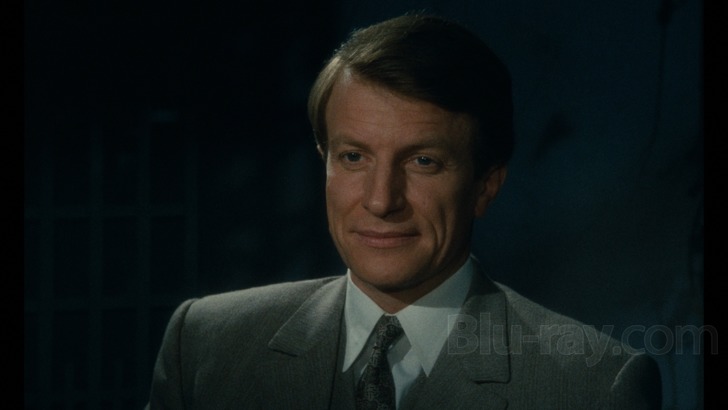
Mélo features an LPCM Mono track in the original French. For a film about musicians (aside from the two violinists, Romaine plays the piano), the film only sporadically features music, and then typically as brief interstitials leading to more overheated dialogue. As such the mono track may be inherently narrow, but it certainly adequately renders what is often a very talky film. Fidelity is fine throughout the presentation, and there are no problems of any kind to report.
Mélo Blu-ray Movie, Special Features and Extras 
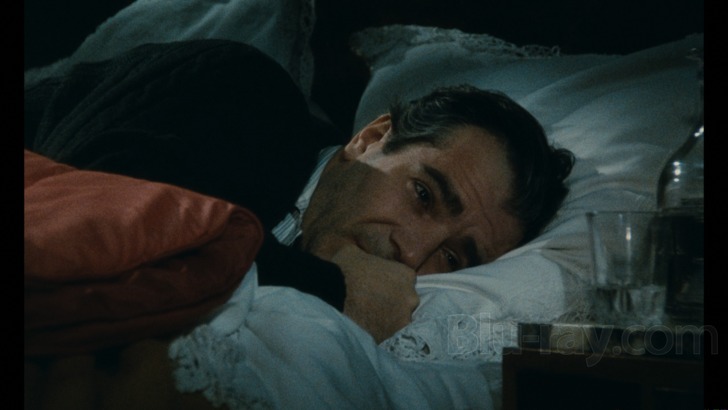
- Jonathan Romney on Mélo (1080p; 15:48) offers Romney's take on Resnais' explicit references to a live theatrical experience.
- Interviews are all in French with English subtitles:
- Alain Resnais (7:18) is an audio interview stemming from 2002.
- Marin Karmitz (1080i; 13:18) (producer)
- Pierre Arditi (1080i; 11:47)
- André Dussollier (1080i; 28:47)
- Sylvette Beaudreau (1080i; 11:49) (script supervisor)
- Jacques Sauinier (1080i; 17:58)
- Theatrical Trailer (1080i; 1:54)
Mélo Blu-ray Movie, Overall Score and Recommendation 
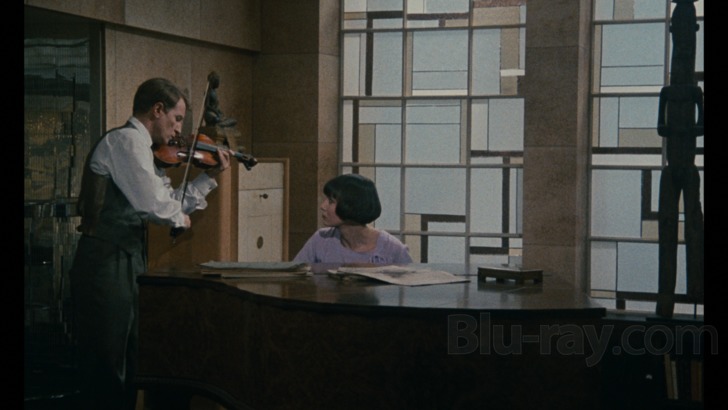
It's perhaps instructive to note that despite the florid emotions on display in the central ménage à trois that informs the film, it was only a fairly tangential character, Christiane (Fanny Ardant), that I personally ended up caring about. Resnais is obviously aiming for some kind of statement with this film, but I have to say I mostly just heard a bunch of talk. Art House habitués may be considerably more engaged by the film than I was. Video is a little lackluster, but audio is fine, and the supplemental package quite enjoyable, for those considering a purchase.
Similar titles
Similar titles you might also like

Flowers of Shanghai
海上花 / Hai shang hua
1998

Coming Home
归来 / Gui Lai
2014

Fox and His Friends
Faustrecht der Freiheit
1975

La vie de Jésus
The Life of Jesus
1997

Nights of Cabiria
Le notti di Cabiria
1957

The Lovers
Les amants
1958

Millennium Mambo
千禧曼波 / Qian xi man bo
2001

Masculin Féminin
1966

Full Moon in Paris
Les nuits de la pleine lune
1984

Claire's Knee
Le genou de Claire
1970

The Vanquished
I Vinti
1953

Asako I & II
寝ても覚めても / Netemo sametemo
2018

Limite
1931

The Bitter Tears of Petra von Kant
Die bitteren Tränen der Petra von Kant
1972

Boy Meets Girl
1984

Saraband
2003

The Green Ray
Summer / Le rayon vert
1986

Crisis
Kris
1946

Loving Couples
Älskande par
1964

Lola
1981